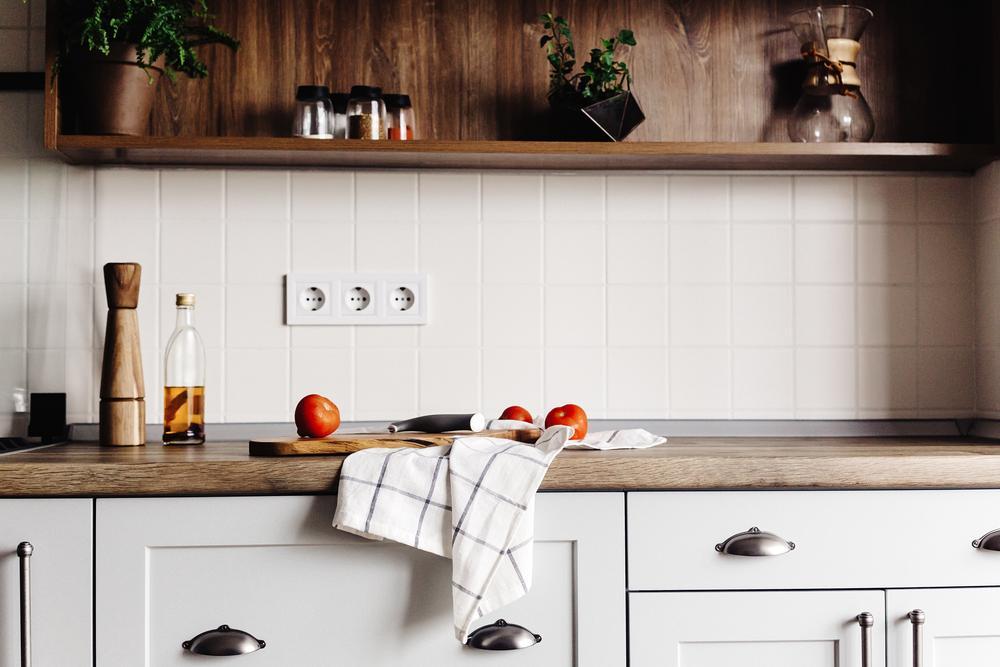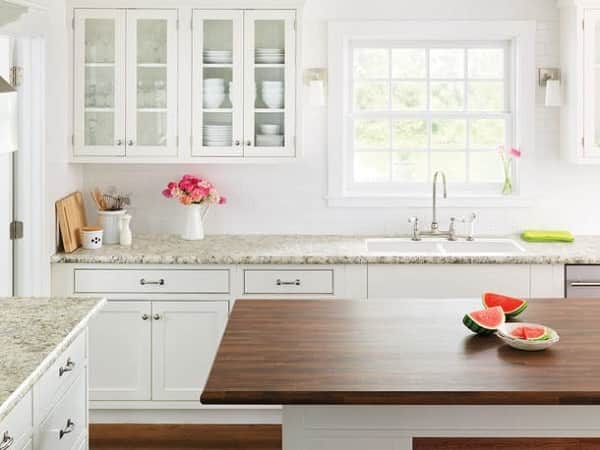The kitchen is often referred to as the heart of the home, and for good reason. It’s where we prepare and share meals with loved ones, entertain guests, and create memories. However, if you’re someone who is tall or has mobility issues, the height of your kitchen countertops may be causing discomfort or inconvenience.

Fortunately, there are several ways to raise the height of your kitchen counters, from simple and budget-friendly solutions to more extensive and permanent options. In this response, we’ll explore some of the ways you can raise the height of your kitchen counters to make your kitchen more comfortable and functional for you.
(We also recommend: How to Estimate the Number of Concrete Bags Needed for a Project)
How to Increase Kitchen Counter Height
Kitchen Countertops
Kitchen counters are a fundamental component of any kitchen, serving as a workspace for food preparation, cooking, and other kitchen-related tasks. They also play a crucial role in the overall look and feel of a kitchen, providing an opportunity to showcase your personal style and preferences.
Whether you prefer a classic granite countertop or a modern, sleek design, the right kitchen counter can elevate the look and functionality of your space. However, finding the right counter for your kitchen can be a daunting task with so many options available.
When choosing a kitchen counter, there are several factors to consider, including durability, maintenance requirements, and cost. Some of the most popular materials for kitchen counters include granite, quartz, marble, concrete, and butcher block.
Granite and quartz are both highly durable and resistant to scratches and heat, making them ideal for busy kitchens. Marble, on the other hand, is known for its elegance and timeless beauty, but it is also more prone to scratches and stains. Concrete and butcher block are both popular options for those seeking a more industrial or rustic look, but they require more maintenance than other materials.
In addition to material, the style and design of your kitchen counter can also have a significant impact on the overall aesthetic of your kitchen. Some popular styles include waterfall edges, which create a seamless transition between the counter and the floor, and backsplashes, which can be made of the same material as the countertop or a contrasting material for added visual interest.
Ultimately, the right kitchen counter for you will depend on your individual needs and preferences. By considering the factors mentioned above and exploring different options, you can find the perfect counter to complement your kitchen and enhance your cooking and entertaining experiences.
(We also recommend: 15 Household Areas That Need Regular Maintenance)
Countertop Pros and Cons
Here are some pros and cons of different countertop materials:
- Granite Countertops:
Pros:
- Extremely durable and scratch-resistant
- Heat-resistant
- Wide range of colors and patterns are available
- Adds value to your home
Cons:
- Expensive
- Requires periodic sealing to prevent stains
- Heavy, requiring professional installation
- Quartz Countertops:
Pros:
- Extremely durable and scratch-resistant
- Low maintenance, does not require sealing
- Non-porous surface resists staining and bacterial growth
- Wide range of colors and patterns are available
Cons:
- Can be more expensive than other materials
- May discolor over time with prolonged exposure to sunlight
- Marble Countertops:
Pros:
- Beautiful and elegant
- Unique veining patterns
- Cool to the touch, making it great for baking
Cons:
- Soft and prone to scratches and stains
- Requires regular sealing to prevent damage
- Can be expensive
- Concrete Countertops:
Pros:
- Customizable design
- Extremely durable and heat-resistant
- Can be made in any shape or size
Cons:
- Requires sealing to prevent stains
- Can crack over time
- Needs periodic resealing to prevent damage
- Butcher Block Countertops:
Pros:
- Warm and rustic look
- Ideal for food preparation
- Can be sanded and refinished if needed
Cons:
- Requires regular oiling to prevent staining
- Can be easily scratched
- Limited color options
It’s important to consider your specific needs and preferences when choosing a countertop material for your kitchen or bathroom. By weighing the pros and cons of each material, you can make an informed decision that suits your lifestyle and budget.
(We also recommend: How to Check if Glass is Oven-Safe with These 12 Steps)
How to Rise Countertop Height

There are several ways to raise the height of kitchen counters, depending on your needs and budget:
- Add countertop extensions: You can add extensions to your existing countertop by purchasing pre-made countertop pieces or having them custom-made to fit your kitchen. These can be made of wood, stone, or other materials and can be secured to the existing countertop with brackets or screws.
- Install new countertops: If you’re looking for a more permanent solution, you can install new countertops that are taller than your existing ones. This will require removing your existing countertops and replacing them with new ones.
- Use furniture risers: If you’re on a budget, you can use furniture risers to elevate your existing countertop. These can be found at most home improvement stores and come in a variety of sizes and styles.
- Install adjustable legs: Some kitchen cabinets and countertops come with adjustable legs that allow you to raise or lower the height of the countertop. If your cabinets and countertops don’t have adjustable legs, you can purchase them and install them yourself.
- Build a platform: If you have some DIY skills, you can build a platform to raise your countertops. This can be made of wood or other materials and can be customized to fit your kitchen’s dimensions and style.
- Install risers: Risers are specially designed platforms that can be installed on top of existing countertops to increase their height. Risers can be made from a variety of materials, including wood, metal, and plastic, and are available in various sizes and heights.
- Add leg extensions: Leg extensions are a simple and affordable solution for raising the height of your kitchen counters. These extensions can be attached to the bottom of your cabinets and adjusted to the desired height. They are typically made of metal or plastic and can be found at most hardware stores.
- Use furniture risers: Furniture risers are an inexpensive and easy way to raise the height of your kitchen counters. These risers are typically made of plastic or wood and can be placed under the legs of your countertop to lift it to the desired height.
- Replace countertops: If you are looking for a more permanent solution, you may want to consider replacing your countertops entirely. This option can be costly, but it allows you to choose the exact height and material you want for your kitchen counters.
- Build a new base: If you have some carpentry skills, you may be able to build a new base for your existing countertops. This option involves removing the existing cabinets and building new ones to support the countertops at the desired height.
Please keep in mind that raising the height of your kitchen countertops may also require you to adjust the height of your appliances, such as your stove and refrigerator, as well as your sink and faucet. It’s best to consult with a professional or do thorough research before making any major changes to your kitchen.
Before attempting to raise the height of your kitchen counters, it’s important to consider your options carefully and choose the one that best fits your needs and budget. Additionally, you may want to consult with a professional to ensure that the modification is safe and will not cause any structural or safety issues in your kitchen.
(We also recommend: The Difference Between a Painter and a Decorator)
Things to Consider
If you are planning to rise the height of your kitchen counter, here are some things to consider before executing the work:
- Existing cabinets: If you are planning to raise the height of your kitchen counter, you will need to make sure that the existing cabinets can support the additional weight. You may need to reinforce the cabinets or add additional support to ensure that they are strong enough to hold the new countertop.
- Plumbing and electrical connections: Raising the height of your kitchen counter may impact the location of your plumbing and electrical connections. You will need to consider whether any changes to these connections will be necessary and how they will be accommodated.
- Accessibility: If you or someone in your household has mobility issues, you may want to consider how raising the height of your kitchen counter will impact accessibility. You may need to install lower cabinets or drawers to make it easier to reach items.
- Aesthetics: Raising the height of your kitchen counter may impact the overall look and feel of your kitchen. You will need to consider how the new height will affect the design and whether it will complement or clash with your existing decor.
- Budget: Raising the height of your kitchen counter can be a significant undertaking, so it’s important to consider the costs involved. You will need to budget for materials, labor, and any necessary modifications to your existing cabinets and connections.
- Material and style: When raising the height of your kitchen counters, you may want to consider whether the new countertop material and style will match your existing decor. You may need to replace your current countertops entirely to achieve a cohesive look.
- Lighting: Raising the height of your kitchen counter can also impact the lighting in your kitchen. You may need to adjust your lighting fixtures to ensure that the area is well-lit and functional.
- Permits: Depending on where you live, you may need to obtain permits or approvals from local authorities before making modifications to your kitchen counters. Check with your local building department to ensure that you are following all necessary regulations.
By considering these factors and planning carefully, you can ensure that raising the height of your kitchen counters is a successful and safe modification that enhances the functionality and aesthetic of your kitchen.
(We also recommend: Quartz Countertop 101: Maintenance and How to Prevent Heat Damage)
In conclusion, kitchen counters are a fundamental component of any kitchen and can significantly impact both the functionality and aesthetic of the space. When choosing a kitchen counter, it’s important to consider factors such as durability, maintenance requirements, and cost, as well as the style and design of the counter.
If you are considering raising the height of your kitchen counter, there are several things to keep in mind, including the strength of your existing cabinets, the impact on plumbing and electrical connections, accessibility, aesthetics, and budget.
By weighing these factors and making an informed decision, you can ensure that your kitchen counter meets your needs and enhances the overall look and feel of your kitchen.





